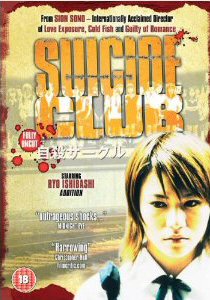
(A.k.a. JISATSU SAKURU; SUICIDE CIRCLE)
54 schoolgirls gather, giggling, at the edge of a bustling train station platform. They hold hands as the latest train approaches, playfully count to three and then jump. There is, quite naturally, an awful lot of blood.
Detective and failing family man Kuroda (Ryo Ishibashi) senses a crime has been committed. But he has a tough time convincing his workmates that what happened is anything more than a well-organised tragedy. That is, until a similar double suicide occurs at a nearby hospital, and identical sports bags are found at the scenes of both calamities.
Upon inspection of the bags, the police discover yard upon yard of rectangles of human flesh inside. Forensics confirms that the strips of flesh from one bag alone suggest the involvement of over 200 people. Now convinced that he has a serious crime on his hands, Kuroda has just one question: what the Hell is going on?
An anonymous caller to the police station, referring to herself as The Bat (Yoko Kamon), points the cops in the direction of a website where the homepage features a succession of white dots. 54 dots turned red, mere moments before the schoolgirls took their fateful leap. 2 more dots turned red, just as the two nurses jumped to their deaths from that hospital window ...
The mystery thickens when teenager Masa takes a plunge from his apartment roof, landing accidentally on his girlfriend Mitsuko (Sayako Hagiwara). She survives, and is taken to the cop shop where Kuroda quizzes her for an explanation. But she remains tight-lipped about her lack of remorse for her boyfriendís death wish, his strange tattoo that many victims seemed to share, and the rectangular strip of flesh missing from his back.
Meanwhile, pre-teen pop act Dessert are gaining heavy TV and radio rotation with their latest hit, "Mail Me". Could they be connected to the ongoing spate of unexplained deaths?
Ten years after its original release, writer-director Sion Sonoís breakthrough film remains a compelling and disturbing piece of work. It starts with one of the most startling sequences in memory and barely rises above the darkness from there on in.
There are moments of odd humour, and scenes that fall within the parameters of pop-art surrealism are littered throughout. But SUICIDE CLUB works best as a haunting thriller punctuated by jarring sequences of spontaneous violence: a mother chops her fingers off with a kitchen knife while her baffled daughter looks on; a group of young students leap from their school roof in a bid to outdo the girls on the train stationís platform ...
Fans of more conventional Western fare may have issues with Sonoís refusal to neatly answer the many questions that his screenplay raises. It may also be a tall ask to put these same viewers through a film that flits casually between moments of brooding atmosphere, ultra gore and even musical interludes.
But SUICIDE CLUB, for all its quirkiness and a final third that unfortunately doesnít live up to the first hour Ė either in terms of intrigue or spectacle Ė remains a vital entry in Japanís post-Millennial horror cycle. Crucially, its themes are what makes it important viewing even today: the influence of media in contemporary Japanese culture; the nationís pressing issue with its disaffected youth; the jaded attitudes, universally, of those who pile through their lives while losing sight of the importance of their loved ones, and even themselves ... "Are you connected to yourself?" the film vitally asks at one literally puppy-crushing moment.
Those who are yet to experience SUICIDE CLUB should expect a grim finale that still manages to offer a glimmer of hope, along with lots of quieter moments that no American remake machine would dare to emulate. Overall, expect to be taken aback by some truly grotesque violence and a colourful burst of pop art which shifts the filmís tone at times from haunting and nightmarish into the garishly surreal.
Cine Du Monde provided an early screener disc (DVD-R) for review. It contained nothing in the way of extras, chapter stops or even menus.
The picture quality on the test disc, therefore, is highly unlikely to be indicative of the final release product. However, on the test disc the film was uncut and enhanced for 16x9 television sets. Colours were bold and blacks were black, albeit the transfer was a little soft and dark. As I say though, the final disc is likely to be much stronger.
Audio-wise, the original Japanese 2.0 soundtrack sounded adequate and burned-in English subtitles were okay.
Cine Du Monde continue to impress with their choice of DVD releases. Sono is a big deal these days (COLD FISH, LOVE EXPOSURE, GUILTY OF ROMANCE etc) and seeing SUICIDE CLUB finally out on UK DVD is a cause for celebration.
By Stuart Willis
| Released by Cine Du Monde |
| Region 2 - PAL |
| Rated 18 |
| Extras : |
| see main review |